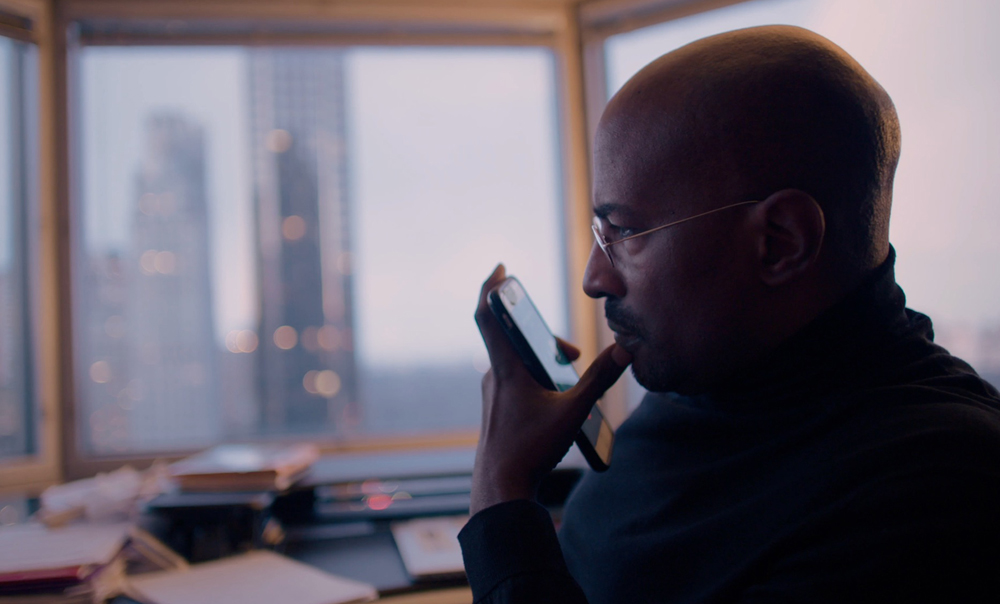“People say who are your friends – here they are,” Van Jones tells the camera in “The First Step,” showing off the shelves full of books that he’s found an unusual way to arrange in order to store as many as he can in his apartment in New York, overlooking Central Park. He’s a lonely figure in Brandon Kramer’s impressive profile, ostensibly for attempting to work with the Trump Administration to pass prison and sentencing reform as a former Obama appointee, with former allies in the Democratic party believing he’s betrayed them, but rather than serve as a metaphor, it seems to be simply a truth about the recently divorced CNN commentator who can’t have many attachments when he’s always on the road for one reason or another and despite having a twin sister, seems alone in his pain as he’s about to lose his mother to cancer.
Jones isn’t made to be an object of pity in “The First Step,” but it’s a compelling central irony that he is so invested in bringing people of different political persuasions together when for better or worse, he envisions himself as Superman, whose logo adorns his comforter – with the belief that he has powers no one else does and his decision to carry that burden alone becoming his form of kryptonite. You’d think he’s up against enough already when prison reform has never had much traction in the halls of Congress, but as Kramer is able to convey Jones has two undeniable political skills in sensing opportunity and seeing common cause between strange bedfellows.
After making his name fresh out of Yale Law finding lawsuits yielded a stronger push for police reform than legislation and uniting Black abolitionists and white conservatives who didn’t want prisons anywhere near them in a coalition to thwart California’s proposed Prop 21 that was set to bring even more into the prison system with broader sentencing power, Jones believed that with Trump adviser Jared Kushner’s own father having been in jail, there was a unique moment to negotiate with a Republican administration, never mind the consequences when other activists were so thoroughly sickened by their views on so many issues that any form of engagement was considered sacrilegious.
Ample room is given to those who express their dismay directly to Jones such as Black Lives Matter co-founder Patrisse Cullors and Andrea James, the executive director of the National Council for Incarcerated and Formerly Incarcerated Women and Girls, and Kramer finds revealing moments throughout where Jones gets in his own way by comporting a little too much to fit into any room he’s in, not realizing those on the outside are always watching. But even when his opportunism can look more ugly than shrewd, the results are rather extraordinary to watch when even before the legislative push for the First Step bill to pass through Congress, Jones and his team are gathering activists from Skid Row in Los Angeles to be in conversation with those from McDowell County, West Virginia whose lives have been touched by opioid addiction to understand how they’re fighting for the same things.
While “The First Step” can be seen as a feel-good triumph of grassroots organizing and coalition building, it is sobering in its clear-eyed recognition that so much that unfolds is political theater and too often perfect is the enemy of good when those on both sides of the aisle feel they can’t bring back anything less than a complete and total victory. In this sense, Jones may find it hard to cut deals yet is ideally suited to be an emblem of these times, a contradictory figure whose attempts to move things forward with bold statements can seem more likely to grab attention for himself than the matter at hand but who knows how to leverage celebrity to accomplish real good. (After all, where else other than this strange political moment, would Kim Kardashian, whose involvement in pushing the First Step bill isn’t made a focus of the film, come across as a voice of reason? During a TV interview she did with Jones when asked if her motives had anything to do with publicity, she could be speaking for the person next to her when she says, “It’s a genuine commitment, but let’s say it isn’t – it’s still saving people’s lives.”) When progress is usually messier as it’s happening than when it’s remembered, the ability of “The First Step” to engage with the moment that it’s in is invaluable.
“The First Step” will screen virtually through the Tribeca Film Festival beginning June 10th through June 15th.




